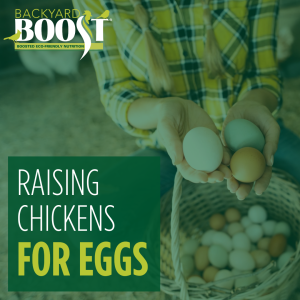
Raising baby chicks is a fun and rewarding experience, but it requires careful preparation and the right equipment to ensure their health and well-being. Whether you’re raising them for eggs, meat or as companions, providing a safe and nurturing environment is vital.
At BioZyme®, makers of Backyard Boost® supplements, our team loves baby chicks and all poultry. We love watching our feathered friends develop from furry little balls to protein bullet producers. One thing we are most excited about is bringing home baby chicks to our flock each spring. We anticipate you might have some questions about the things you need to have with baby chicks. That is why we created this resource. We know it can be daunting, but we don’t want you to shy away from starting your own flock just because of the unknown. So, sit back and check your list of things you need to have with baby chicks.
Preparing for baby chicks is almost as fun as getting your new chicks. Let’s flock to the nearest farm store or start adding to your cart!
Essential Things You Need to Have with Baby Chicks
It is an egg-cellent idea to purchase your supplies and have them ready before you bring your chicks home. It’s much easier to transition your new chicks into a home prepared for them. In other words, we don’t suggest buying your chicks on a whim or a dare.
Following is the list of things you need to have with baby chicks:
Brooder Box & Brooder Cover
A brooder is a safe, warm enclosure for baby chicks once they arrive at their new home. Brooders can vary in material; they can be homemade brooder or store bought. They can be a plastic tote, cardboard box or a commercial brooder. The brooder should allow at least six inches per chick, initially, moving up to 2 square feet per chick as they grow. Ensure the brooder has high walls to prevent chicks from jumping out and that it is placed in a draft-free location.
A breathable brooder cover, such as mesh or a wire lid, prevents chicks from escaping while allowing ventilation. This is especially important as chicks grow and become more active.
Heat Source
Keeping your baby chicks warm is critical when they are little, as their bodies have not yet learned how to regulate their body temperatures.
Provide a heat lamp or heat bar that is close enough to provide them warmth yet far enough away that they won’t try to jump up at it. If they do, they could potentially burn or injure themselves. Only heat one area of the brooder so they have a place to go for warmth and space to cool off.
Initially, baby chicks need temperatures around 95 degrees for the first week. Gradually decrease the temperature by 5 degrees each week until you reach a comfortable temperature of about 75 degrees. At this time, the chicks are probably big enough to move to a coop.
Bedding Material
Bedding is another important aspect of keeping your chicks warm and healthy. Especially if using a plastic brooder, you will want to provide some bedding, so the chicks don’t slip and slide, causing harm to their legs.
Bedding varieties include pine shavings, clean sand, paper towels, shredded newspaper and burlap. You should avoid cedar chips or other aromatic wood chips that can be toxic to chicks.
Feed
Feeding your baby chicks is simple, as you will need a chick starter feed and a chick feeder. Most chick feeders come with a divided trough to keep chicks from walking, playing in the food or kicking it out into the bedding.
Raising the feeder slightly will help reduce contamination of the feed by the chickens messing in it and leaving behind feathers, dirt or feces. Once your birds are starting to grow and transition to a bigger size food, offer them Backyard Boost® Daily Essentials. Daily Essentials is a pelleted, natural protein supplement for all classes of poultry.
Not only rich with protein but Daily Essentials is also fortified with a prebiotic, vitamins, minerals and organic trace minerals. It also contains AO-Biotics® EQE, a postbiotic proven to enhance egg quality and production. Daily Essentials helps maximize growth and egg production and supports overall flock health.
Water
Water is the most essential nutrient for animals and a one of the most important things you need to have with baby chicks. Ensure you provide your chicks with clean, fresh water each day. And clean the waterer each day to ensure it is free of dirt and waste.
The water dish should be shallow, or your chicks could accidentally drown. If the water dish is deeper, add a layer of pebbles to the bottom to keep it shallow enough to be safe. It will also weigh the dish down, so it does not easily tip over.
Promote water intake and good health by providing Backyard Boost® Defense. This liquid supplement promotes feed and water intake during times of stress and recovery to help support digestive health and a healthy inflammatory response. Add it to their water daily for best results.
Backyard Boost Defense is a liquid supplement for poultry designed to support digestion and healthy immune response. Backyard Boost Defense contains AO-Biotics® Amaferm®, a prebiotic research-proven to enhance digestibility, and provides nutrients needed in times of stress. By adding this green liquid to their fresh water daily, you promote water intake and hydration.
Thermometer
A thermometer is necessary for monitoring the brooder’s temperature. Place it at chick level to ensure an accurate reading. If chicks huddle together, they may be too cold, and if they spread far apart, it might be too hot.
Grit
Chick grit is needed if you are feeding them anything other than starter feed. It helps with digestion by grinding food in their gizzard. Grit should be offered in small amounts to avoid overconsumption.
Safe Environment
Keep the brooder in a secure location away from chicken predators. Household pets like cats and dogs should not have access to the brooder, as they may pose a threat to the chicks.
Socialization & Handling
Handling chicks gently and frequently helps them become accustomed to humans. However, avoid excessive handling in the first few days, as they need time to adjust to their new surroundings. We do advise singing and talking to them those first few days so they get used to your voice and adjusted to the sounds around them.
Transition Plan to Coop
By 6-8 weeks, chicks will outgrow the brooder and need to move to a chicken coop. It is amazing how quickly your chicks grow, and if you don’t believe it, take a photo of them each week on the same day for comparison.
Once you are ready to transition your chicks to the coop, you will still need many of the same supplies: feed, water, bedding and heat depending on your climate. Ensure the coop is predator-proof, well-ventilated and provides enough space for each bird. Gradually expose chicks to the outdoors to acclimate them to the environment.
There is a lot to consider when creating and caring for your chicken coop. Be sure to have enough space per bird, roosting bars, nesting boxes and proper ventilation. If you live within city limits, be sure to follow any city ordinances for owning chickens.
Welcome to the Flock
We’d love for you to include Backyard Boost in your list of things you need to have with baby chicks. We can tell you all day about how important this supplement is, but we thought you’d appreciate hearing from your peers who have already used it:
“Backyard Boost® is simply amazing! I picked up chicks from the post office. They were lethargic, droopy eyes, and I thought I would definitely lose some. I dipped all their beaks in water, and they fought me. I then took the water and added Backyard Boost Defense, I walked out and left them. I came back 15 minutes later, and all the chicks were drinking and had drunk half of the water I put in with the Backyard Boost in it. All my chicks are alive, healthy and happy.” – Patti Wood
“During the summer, we noticed a decline in our flock from lighter combs to decreased laying. Backyard Boost® Defense has livened up our flock tremendously, and we have noticed a little pep in their step, too! Combined with Backyard Boost Daily Essentials, our flock is performing and feeling its best!” – Taylor Couch
Get your Backyard Boost Today!
We hope this resource has helped you discover things you need to have with baby chicks. Although the list isn’t long, keeping your chicks healthy, thriving and surviving is essential! We know getting baby chicks is thrilling. It is also exciting to see them grow and change. That’s why we suggest providing your flock with eco-friendly nutrition from Backyard Boost today. Get your hands on industry-leading backyard chicken supplements now!
Ordering Backyard Boost is simple: purchase via our online store or from one of our online retail partners.
Perhaps you prefer to shop in person. Our Where to Buy tool can help you find an authorized BioZyme retailer closest to you.
Stay In the Know
New to keeping baby chicks and looking for more educational resources? Use our Chicken Care Cycle as your guide to all things backyard chicken care.
Or, if email is more your speed, you can sign up for our regular e-newsletter. That will help you stay current on all our informational blogs, educational resources, and great product deals!

